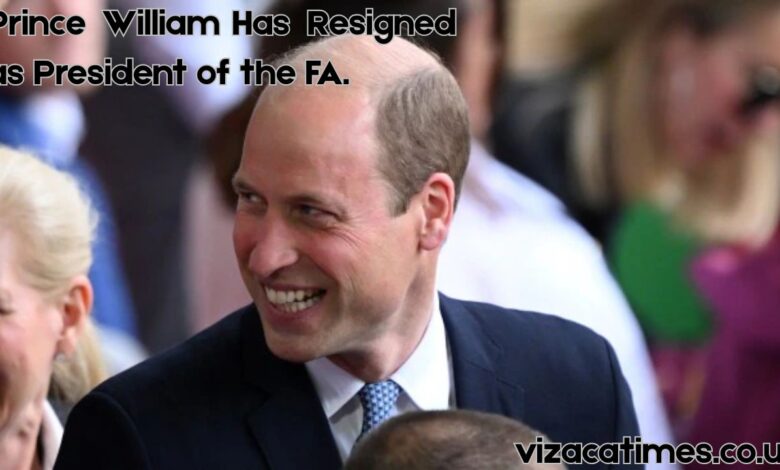Prince William Has Resigned as President of the FA.: A New Chapter in Royal and Football History

Introduction to a Surprising Royal Decision
The announcement that Prince William has resigned as president of the FA has sent ripples through both the royal and sporting worlds. Known for his deep involvement with football and his consistent support of the game across all levels, Prince William’s decision to step down marks a significant shift in his public engagements. This change not only signals a new direction for the Football Association (FA) but also raises questions about the future role of the monarchy in UK sports institutions.
Prince William’s Longstanding Relationship with the FA
Prince William has served as the president of the Football Association (FA) since 2006. Over nearly two decades, he has used his position to promote football at every level, from grassroots community programs to the international stage. His presidency was more than symbolic; it represented his personal passion for the sport. From attending matches at Wembley to speaking out about mental health in football, Prince William has been an active and visible leader.
The news that Prince William has resigned as president of the FA is particularly poignant given how synonymous he became with the modern image of the association. His presence at FA Cup finals, support for the England teams, and behind-the-scenes advocacy contributed to a new level of prestige and relatability for the FA.
Motivations Behind the Resignation
While Buckingham Palace has yet to release a comprehensive statement detailing all reasons, insiders suggest that Prince William has resigned as president of the FA due to the increasing responsibilities associated with his role as the Prince of Wales. Since taking on this role following the passing of Queen Elizabeth II and the coronation of King Charles III, his schedule has become more demanding, with new royal duties taking precedence.
The Prince has also taken on greater responsibilities related to the Duchy of Cornwall, environmental leadership, and global diplomatic engagements. In this light, his resignation reflects a prioritization of broader royal commitments rather than a retreat from public service altogether.
Reactions from the Football Community
Unsurprisingly, the news that Prince William has resigned as president of the FA has elicited a wide range of reactions from players, officials, fans, and commentators. Many in the football community have expressed gratitude for his years of support, while others speculate on who might succeed him in this prestigious role.
Key figures in English football have praised the Prince for his commitment to mental health awareness and his efforts to modernize the image of the FA. His departure has left a notable vacancy in leadership, prompting discussions about the future direction of the organization and the kind of figure who can continue the work he began.
A Modern Royal in a Modern Game
One of the most appreciated aspects of Prince William’s tenure was how he brought a modern, accessible image to both the FA and the royal family. He was often seen engaging directly with young players, coaches, and fans, making him a relatable and respected figure within the sport.
Prince William has resigned as president of the FA, but his impact lingers. From supporting initiatives like “Heads Up,” a mental health campaign in football, to championing diversity in the sport, his contributions modernized the royal role within British athletics. His resignation, therefore, is not the end of his influence but rather the end of a specific chapter.
The Future of the FA Without Prince William
With Prince William has resigned as president of the FA becoming official news, the question of succession is now at the forefront. The FA will need to appoint a new figure who can not only carry on Prince William’s legacy but also bring a fresh perspective to the role.
Potential successors might include other members of the royal family, public figures with ties to football, or individuals with a background in sport governance. Whoever takes on the role will inherit an institution that has seen modernization, growth, and improved public trust during Prince William’s presidency.
Impact on the Monarchy’s Relationship with Sports
Prince William’s resignation represents more than just a personnel change at the FA—it also reflects a broader shift in how the royal family is engaging with national institutions. As roles become more demanding and time-consuming, the monarchy must choose where it can make the greatest impact. Prince William has resigned as president of the FA not out of disinterest, but as part of a strategy to focus royal energy on larger global and domestic responsibilities.
However, this doesn’t mean that the monarchy will cease to be involved in sports. On the contrary, the royal family has deep and lasting ties with many British sporting institutions, and it is likely these relationships will continue through different figures and in new formats.
Public Sentiment and National Discussion
The phrase Prince William has resigned as president of the FA has become a trending topic across social media platforms, with supporters, critics, and sports lovers all chiming in. While some lament the loss of a dedicated figurehead, others view it as a natural progression in the life of a royal who is preparing for an even larger leadership role.
The general public has shown a mixture of surprise and understanding. Many admire Prince William’s decision to prioritize his broader obligations, while others hope to see him continue supporting football in a less formal capacity. Regardless, his departure has sparked a national conversation about the evolving role of the royals in public life.
A Legacy of Passion and Purpose
When examining Prince William’s years with the FA, it becomes clear that his role was far more than ceremonial. His legacy includes real contributions to the conversation around mental health in sport, youth engagement, and diversity. Prince William has resigned as president of the FA, but his work has left an enduring mark on the organization and the culture surrounding British football.
His approachability, sincerity, and genuine love for the game made him an ideal ambassador. As the FA prepares for its next chapter, it does so on a foundation that Prince William helped to build—one of inclusion, innovation, and integrity.
What’s Next for Prince William?
Now that Prince William has resigned as president of the FA, attention turns to his future priorities. As Prince of Wales, he is expected to play a more prominent role in national governance, charitable leadership, and representing the UK on the world stage.
Environmental advocacy, youth development, and mental health will likely remain central themes in his public work. In stepping away from the FA, Prince William is making room for a broader, possibly even global, agenda that matches his new responsibilities.
Conclusion: An End and a Beginning
The news that Prince William has resigned as president of the FA is both a farewell and an opening. It’s a goodbye to an era where a modern royal stood shoulder to shoulder with fans, players, and institutions to advance the game he loves. But it is also the beginning of a new phase in royal engagement—one that sees Prince William stepping further into the shoes of leadership for a modern Britain.
His departure leaves behind a transformed FA and a public newly aware of the royal family’s ability to influence cultural institutions meaningfully. Prince William’s journey with football may no longer be formal, but his legacy in the game will remain for years to come.
Also Read: Jaguar Wright Net Worth, Career, and Controversies: A Deep Dive into Her Life and Legacy



